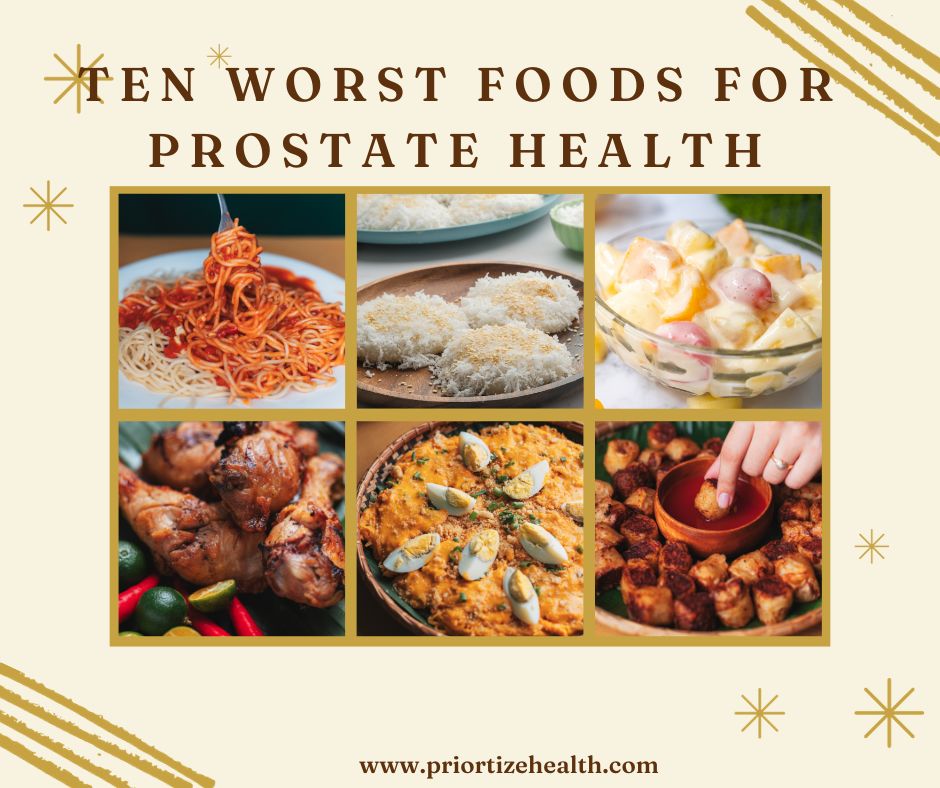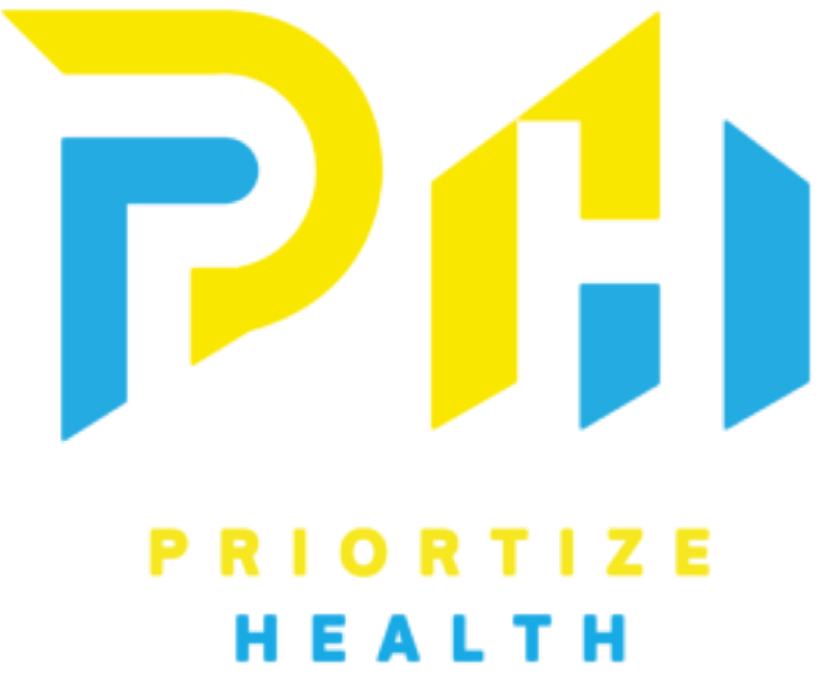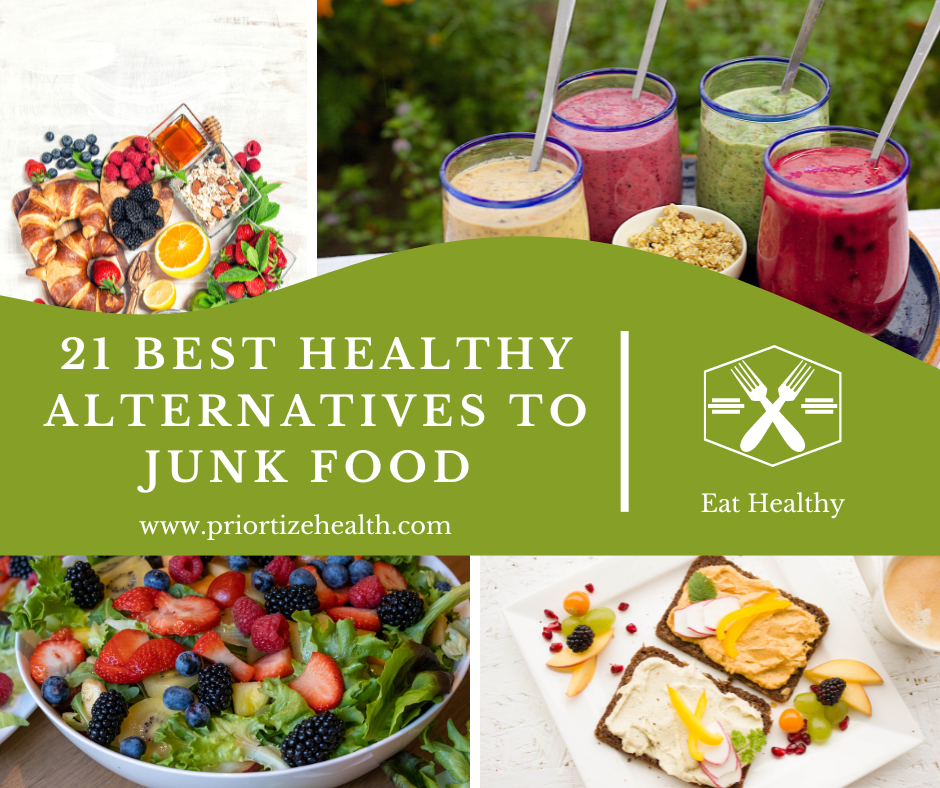
Ten Worst Foods for Prostate Health
Prostate health is an essential aspect for good health of men. It plays a pivotal role in urinary function, sexual health, and the prevention of serious conditions such as prostate cancer. It’s a health concern that demands attention. What you choose to consume can impact the well-being of your prostate gland. This article aims to shed light on a critical aspect of prostate health – the role of diet. We will have a look at the ten worst foods that can have effect on prostate health. It offers valuable insights and alternatives to assist you with pursuing informed dietary decisions. Have you ever wondered whether your daily food intake might be compromising your prostate health? Join us on this journey to discover the answers and take proactive steps toward a healthier future.
What is Prostate?
The prostate is a tiny, walnut-sized gland that is important for the male reproductive system. It lies underneath the bladder and surrounds the urethra. The urethra is a tube that transfers urine from the bladder out of the body. The most important role of the prostate is to create a fluid that blends in with sperm from the testicles and other fluids from the seminal vesicles to make semen. This semen helps nourish and transport sperm during ejaculation. As men get older, the prostate can sometimes become enlarged. This causes problems with urination. It’s also a gland where cancer can develop. So, men really should have regular check-ups with a specialist to screen their prostate health.
How diet affects Prostate health?
Diet can fundamentally affect prostate health. Here are a few manners in which diet can affect the prostate:
- Inflammation: A diet high in processed foods, saturated fats, and sugars can promote inflammation in the body. This may contribute to prostate problems. In any case, an eating routine rich in fruits, vegetables, whole grains, and healthy fats (such as those found in nuts and fish) can assist with reducing inflammation.
- Obesity: Being overweight or obese may result in an increased risk of prostate problems. This comprises of an extended prostate (benign prostatic hyperplasia) and prostate cancer. A proper eating routine and routine exercise can assist with maintaining a healthy weight.
- Antioxidants: Antioxidants might assist with protecting the prostate from damage caused by free radicals. They can be vitamins C and E, selenium, and lycopene (found in tomatoes). These antioxidants are present in fruits and vegetables.
- Fats: Some studies suggest that an eating routine high in saturated fats might increase the risk of prostate cancer. Food items like red meat and dairy products are some of the examples. Replacing some of these fats with healthier fats like those from fish, nuts, and olive oil might be beneficial.
- Fiber: Food varieties that are high in fiber may be help to lower risk of prostate problems. They can be whole grains, legumes, and fruits. Fiber supports digestive health and may have protective impacts.
- Lycopene: Lycopene is a strong cell reinforcement found in tomatoes. A few examinations suggest that a diet that has high lycopene content might help in reducing the risk of prostate cancer.
- Soy: Soy products contain substances called phytoestrogens, which might have a protective effect on the prostate. Some studies have shown that consuming soy-based food varieties might bring down the risk of prostate cancer.
- Limiting alcohol: Excessive alcohol consumption might also be one of the causes for the risk of prostate cancer. Moderation in alcohol intake is advised.
- Hydration: Staying well-hydrated is important for prostate health. It can assist with flushing toxins out of the body and support normal urinary function.
It’s vital to take note of that while diet plays a role in prostate health, might be one of the factors. Genetics, age, and other lifestyle choices also influence prostate health. In the event that you have concerns about your prostate health, it’s a good idea to talk with a medical service proficient. They can give direction tailored to your specific situation. We can detect these issues at earlier stages through regular screenings and check-ups. It will also help in management of prostate-related conditions.
Foods that benefit Prostate health
There are certain foods that benefit prostate health due to their nutritional content. No specific food can ensure the prevention of prostate problems. But incorporating these items into a decent eating regimen might contribute to better prostate health. Here are some food sources that are often recommended:
- Fatty Fish: Fish like salmon, mackerel, and trout have a good content of omega-3 unsaturated fats. These healthy fats have mitigating properties. They might assist with reducing the risk of prostate cancer.
- Tomatoes: Tomatoes contain lycopene, a powerful cell reinforcement. It has essential nutrients that lower the risk of prostate cancer. Cooking tomatoes can make the lycopene absorbed by the body in an easy manner.
- Berries: Berries like blueberries, strawberries, and raspberries are rich in antioxidants. They can help protect cells, including those in the prostate, from damage.
- Cruciferous Vegetables: Some vegetables are high in phytonutrients and fiber. For example, broccoli, cauliflower, Brussels sprouts, and kale. They might act as a shield against prostate cancer.
- Green Tea: The polyphenols present in green tea have antioxidant properties. Drinking green tea on consistent manner might bring improvement in the prostate health.
- Soy Products: Soybeans and soy products like tofu have phytoestrogens called isoflavones. There are some investigations that suggest these compounds might lower the risk of prostate cancer.
- Nuts: Nuts are a decent wellspring of healthy fats, fiber, and cell reinforcements. Some examples are almonds, walnuts, and pistachios. They can be a nutritious bite that upholds our health, including prostate health.
- Berries: Berries like blueberries, strawberries, and raspberries are rich in antioxidants. They can help protect cells, including those in the prostate, from damage.
- Pomegranates: Pomegranate juice and seeds are high in antioxidants. They may have anti-inflammatory effects that benefit prostate health.
- Legumes: Food varieties like lentils, beans, and peas are high in fiber and plant-based protein. They can be a nutritious part of a prostate-friendly diet plan.
- Olive Oil: Olive oil, especially extra virgin olive oil, contains monounsaturated fats and antioxidants, which can be beneficial for overall health.
- Turmeric: The active compound in turmeric, called curcumin, has anti-inflammatory properties. It might provide potential results for prostate health.
- Garlic: Garlic contains sulfur compounds that might have protective impacts against prostate cancer.
Ten Worst Foods for Prostate Health
There is no definitive list of the absolute worst foods for prostate health. But certain dietary choices and foods are generally considered less beneficial for the prostate health. The following are ten types of food varieties and dietary habits that you might need to limit or avoid:
- Processed Meats: Food varieties like bacon, sausages, hot dogs, and processed deli meats are often high in saturated fats and sodium. They may not be conducive to prostate health.
- Red Meat: We should not consume red meat in excess, especially when it’s cooked at high temperatures (e.g., grilled or charred). There are chances to worsen the risk of prostate cancer.
- High-Fat Dairy Items: Full-fat dairy items, like whole milk and cheese, can be high in saturated fats. It might not be ideal for prostate health when consumed in excess.
- Trans Fats: Foods containing trans fats like hydrogenated oils, may lead to inflammation and health concerns. Check food labels for trans fats and try to keep away from them.
- High-Sugar Foods: Food varieties and drinks high in added sugars, may cause obesity and inflammation. It may affect prostate health. These foods can be like sugary sodas, candies, and desserts.
- Excessive alcohol: Consuming alcohol in excess might create health issues and also increase the risk of prostate cancer. Moderation in alcohol intake is necessary.
- Fried food varieties: Fried foods are high in unhealthy fats and may promote inflammation. Limit fried food varieties in your eating routine.
- Excessive Salt: Eating salt in excess quantity can lead to high blood pressure. It may contribute to prostate problems. Reducing sodium intake by avoiding excess salted processed foods is advisable.
- Caffeine: A moderate caffeine consumption is generally safe. But excessive caffeine intake from sources like coffee and energy drinks may lead to urinary issues, including frequent urination.
- Low-Fiber Foods: A diet lacking in fiber from fruits, vegetables, and whole grains may not support digestive health. It can affect the prostate.
Best practices for Prostate health
We should try and maintain a good prostate health. It is essential for overall well-being, particularly as men age. Here are some best practices and lifestyle tips to support prostate health:
- Balanced Diet: Follow eating a complete nutrition diet. It should include fruits, vegetables, whole grains, lean proteins, and healthy fats. Antioxidant-rich foods like berries, tomatoes, and leafy greens can act as cherry on the top.
- Limit Red Meat: Limit your consumption of red meat, especially processed and charred meats. They might add issues to the risk of prostate cancer. Add lean cuts of meat and poultry as it is a better option.
- Healthy Fats: Plan your diet in such a manner that you eat healthy fats in your diet. They can be in form of fatty fish (like salmon and trout), nuts, seeds, and olive oil. Omega-3 fatty acids can have anti-inflammatory properties.
- Fiber-Rich Foods: High-fiber foods support digestive health, which can benefit the prostate. They are like beans, lentils, whole grains, and vegetables.
- Hydration: Stay well-hydrated by drinking a lot of water. Proper hydration helps maintain urinary function and flushes toxins from the body.
- Limit Salt: Reduce your intake of sodium by not eating too much of processed and salty foods. Eating too much of salt can boost your blood pressure issues and affect prostate health.
- Moderate Alcohol: If you consume alcohol, do so in moderation. Heavy alcohol consumption might worsen the prostate problems.
- Caffeine Moderation: Limit caffeine intake, particularly from coffee and energy drinks. Excessive caffeine can contribute to urinary issues.
- Regular Exercise: Perform physical activity on regular basis. It can be in form of brisk walking, jogging, swimming, or cycling. Exercise is beneficial in maintaining a healthy weight and reducing the risk of prostate issues.
- Maintain a Healthy Weight: Obesity increases risk of prostate problems. A proper combination of diet and exercise can help you to achieve healthy weight.
- No Smoking: If you smoke, consider quitting. Smoking not only affects prostate cancer, but also have risk of various health issues.
- Regular Check-ups: Schedule regular check-ups with proper guidance from your healthcare provider. They will track your prostate health and give guidance on appropriate screenings based on your age and risk factors. Some examples are prostate-specific antigen (PSA) tests or digital rectal exams (DREs).
- Stress Management: Practice stress-reduction techniques like meditation, yoga, or deep breathing exercises. Chronic stress can adversely affect our health, including the prostate.
- Prostate Screenings: Discuss prostate cancer screenings with your healthcare provider. It is vital to understand about your family history or other risk factors. Screening recommendations vary by age and individual risk.
- Safe Sex: Practicing safe sex can reduce the risk of sexually transmitted infections (STIs) that could affect the prostate.
Remember that individual health needs can vary. Thus, it’s fundamental to talk with a medical care proficient for personalized advice and recommendations. Regular check-ups and open communication with your doctor are key to take good care of prostate health as you age.
FAQ’s:
Ans: Yogurt (curd) can be beneficial for prostate health because it is a source of probiotics and calcium. Probiotics may support digestive health. It can have a positive impact on our well-being, including the prostate. Calcium reduces the risk of prostate cancer in some studies. But moderation is key, as excessive dairy consumption may have drawbacks. It’s essential to include yogurt as part of a balanced diet for its potential benefits to prostate health.
Ans: Tomatoes are often considered the best fruit for prostate health. They contain a strong cell reinforcement called lycopene, that could reduce the risk of prostate cancer. Cooking tomatoes or consuming them with a limited quantity of healthy fat (like olive oil) can improve lycopene absorption. Incorporating tomatoes and tomato products into your diet can be a proactive choice for prostate health.
Ans: A diet to support prostate recovery should include fruits, vegetables, and fiber-rich foods. They provide essential nutrients and antioxidants. Lean proteins aid in tissue repair, while healthy fats, like omega-3s, can reduce inflammation. Staying hydrated, limiting salt, and incorporating probiotics can assist in well-being. Turmeric’s anti-inflammatory properties may be beneficial, and green tea’s antioxidants could aid recovery. Lean dairy and calcium-rich foods are also valuable. Talk with medical care experts or dietitians for personalized dietary guidance during recovery. Individual needs may differ based on the specific condition and treatment.






2 Comments
Hey there You have done a fantastic job I will certainly digg it and personally recommend to my friends Im confident theyll be benefited from this site
Hey there You have done a fantastic job I will certainly digg it and personally recommend to my friends Im confident theyll be benefited from this site